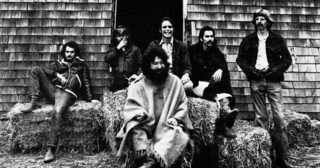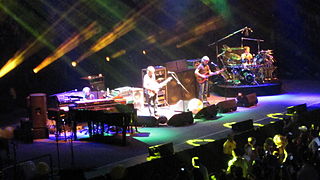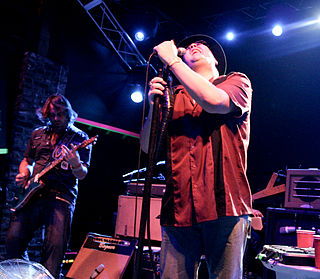
The Grateful Dead was an American rock band formed in 1965 in Palo Alto, California. The band is known for its eclectic style, which fused elements of rock, blues, jazz, folk, country, bluegrass, rock and roll, gospel, reggae, and world music with psychedelia; for its differentiated live performances centered around improvisation; and for its devoted fan base, known as "Deadheads". According to the musician and writer Lenny Kaye, "Their music touches on ground that most other groups don't even know exists." For the range of their influences and the structure of their live performances, the Grateful Dead are considered "the pioneering godfathers of the jam band world".

Phish is an American rock band formed in Burlington, Vermont, in 1983. The band consists of guitarist Trey Anastasio, bassist Mike Gordon, drummer Jon Fishman, and keyboardist Page McConnell, all of whom perform vocals, with Anastasio being the lead vocalist. The band are known for their musical improvisation and jams during their concert performances, and for their devoted fan following.

A mixing console or mixing desk is an electronic device for mixing audio signals, used in sound recording and reproduction and sound reinforcement systems. Inputs to the console include microphones, signals from electric or electronic instruments, or recorded sounds. Mixers may control analog or digital signals. The modified signals are summed to produce the combined output signals, which can then be broadcast, amplified through a sound reinforcement system or recorded.

A recording studio is a specialized facility for recording and mixing of instrumental or vocal musical performances, spoken words, and other sounds. They range in size from a small in-home project studio large enough to record a single singer-guitarist, to a large building with space for a full orchestra of 100 or more musicians. Ideally, both the recording and monitoring spaces are specially designed by an acoustician or audio engineer to achieve optimum acoustic properties.

Multitrack recording (MTR), also known as multitracking, is a method of sound recording developed in 1955 that allows for the separate recording of multiple sound sources or of sound sources recorded at different times to create a cohesive whole. Multitracking became possible in the mid-1950s when the idea of simultaneously recording different audio channels to separate discrete "tracks" on the same reel-to-reel tape was developed. A "track" was simply a different channel recorded to its own discrete area on the tape whereby their relative sequence of recorded events would be preserved, and playback would be simultaneous or synchronized.

A Deadhead or Dead head is a fan of the American rock band the Grateful Dead. The Deadhead subculture originated in the 1970s, when a number of fans began traveling to see the Grateful Dead in as many shows or festival venues as they could. As more people began attending live performances and festivals, a community developed. The Deadhead community has since gone on to create slang and idioms unique to them.

Phil Lesh and Friends is an American rock band formed and led by Phil Lesh, former bassist of the Grateful Dead.

A bootleg recording is an audio or video recording of a performance not officially released by the artist or under other legal authority. Making and distributing such recordings is known as bootlegging. Recordings may be copied and traded among fans without financial exchange, but some bootleggers have sold recordings for profit, sometimes by adding professional-quality sound engineering and packaging to the raw material. Bootlegs usually consist of unreleased studio recordings, live performances or interviews without the quality control of official releases.
Richard Allan "Dick" Latvala was an American tape archivist for the Grateful Dead. He started the CD series Dick's Picks, a series that selects live music from Grateful Dead concerts. The first volume of Dick's Picks was released in 1993. The series continued after Latvala's death in 1999 until 2005, with later volumes being selected by David Lemieux. In 2012, the series inspired a spin-off officially known as Dave's Picks.

One from the Vault is a live album by the Grateful Dead, recorded on August 13, 1975, at the Great American Music Hall in San Francisco, California, for a small audience of radio programmers. Three weeks later, the concert was broadcast nationwide on FM radio through Metromedia, after which the radio show was widely traded by fans on cassettes, and sold in bootleg LP versions under various titles including Make Believe Ballroom, becoming the most widely circulated Grateful Dead bootleg.

Dick's Picks Volume 4 is the fourth live album in the Dick's Picks series of releases by the Grateful Dead. It was recorded on February 13 and February 14, 1970, at the Fillmore East in New York City, and released in February 1996. It was the first of the Dick's Picks CDs to have three discs. It was also the first Dead album to include the song "Mason's Children".
The Led Zeppelin bootleg recordings are a collection of audio and video recordings of musical performances by the English rock band Led Zeppelin which were never officially released by the band, or under other legal authority. The recordings consist of both live concert performances and outtakes from studio sessions conducted by the band. Many hundreds of Led Zeppelin bootlegs exist, and are widely collected by fans.

Dick's Picks Volume 18 is a three-CD live album by the rock band the Grateful Dead. It was recorded on February 3, 1978, at the Dane County Coliseum in Madison, Wisconsin and on February 5, 1978, at the UNI-Dome in Cedar Falls, Iowa. There are also two songs from the February 4, 1978 show at the Milwaukee Auditorium in Milwaukee, Wisconsin. The album was released in June 2000.

Dick's Picks Volume 25 is a four-CD live album by the rock band the Grateful Dead. It was recorded on May 10, 1978 at Veteran's Memorial Coliseum in New Haven, Connecticut and on May 11, 1978 at the Springfield Civic Center Arena in Springfield, Massachusetts. It was released on July 20, 2002.
Dan Healy is an audio engineer who often worked with the American rock band the Grateful Dead. He succeeded Alembic and Owsley "Bear" Stanley as the group's chief sound man after the Wall Of Sound in 1974 and subsequent band hiatus through 1975. A favorite amongst Deadheads for many years, he helped to introduce a tapers section at Grateful Dead concert to allow audience recording of live concerts. Healy would often provide direct output from the soundboard for the tapers to directly patch into their recorders.

This is a glossary of jazz and popular music terms that are likely to be encountered in printed popular music songbooks, fake books and vocal scores, big band scores, jazz, and rock concert reviews, and album liner notes. This glossary includes terms for musical instruments, playing or singing techniques, amplifiers, effects units, sound reinforcement equipment, and recording gear and techniques which are widely used in jazz and popular music. Most of the terms are in English, but in some cases, terms from other languages are encountered.

A jam band is a musical group whose concerts and live albums substantially feature improvisational "jamming." Typically, jam bands will play variations of pre-existing songs, extending them to improvise over chord patterns or rhythmic grooves. Jam bands are known for having a very fluid structure, playing long sets of music which often cross genre boundaries, varying their nightly setlists, and segueing from one song into another without a break.

Dave's Picks Volume 8 is a three-CD live album by the rock band the Grateful Dead. It contains the complete concert from November 30, 1980, at the Fox Theatre in Atlanta, Georgia. It was produced as a limited edition of 13,000 numbered copies, and was released on November 1, 2013.
Betty Cantor-Jackson is an American audio engineer and producer. She is best known for her work recording live concerts for the Grateful Dead from the late 1960s to the early 1980s, including the Cornell 5/8/77 album. She is noted for her ear for recording and her long tenure with the band.















